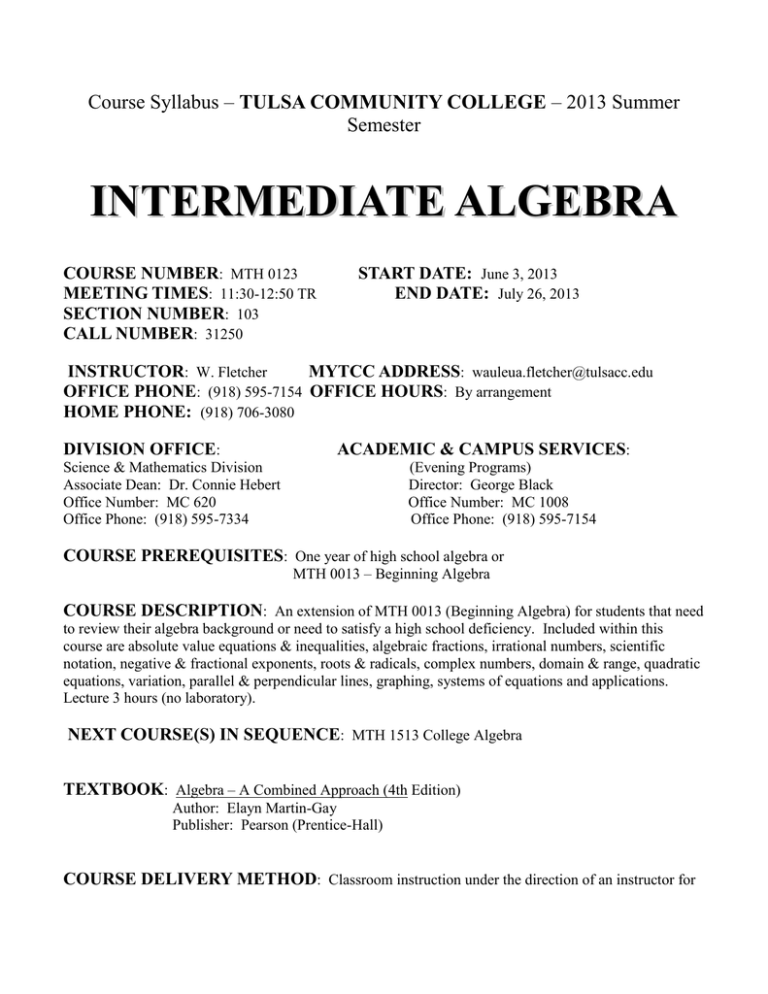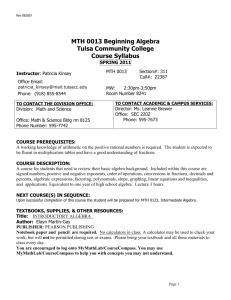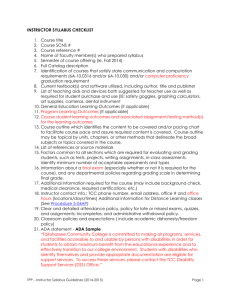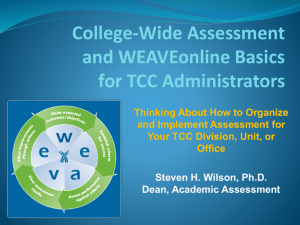
Course Syllabus – TULSA COMMUNITY COLLEGE – 2013 Summer
Semester
INTERMEDIATE ALGEBRA
COURSE NUMBER: MTH 0123
MEETING TIMES: 11:30-12:50 TR
SECTION NUMBER: 103
CALL NUMBER: 31250
START DATE: June 3, 2013
END DATE: July 26, 2013
INSTRUCTOR: W. Fletcher
MYTCC ADDRESS: wauleua.fletcher@tulsacc.edu
OFFICE PHONE: (918) 595-7154 OFFICE HOURS: By arrangement
HOME PHONE: (918) 706-3080
DIVISION OFFICE:
ACADEMIC & CAMPUS SERVICES:
Science & Mathematics Division
Associate Dean: Dr. Connie Hebert
Office Number: MC 620
Office Phone: (918) 595-7334
(Evening Programs)
Director: George Black
Office Number: MC 1008
Office Phone: (918) 595-7154
COURSE PREREQUISITES: One year of high school algebra or
MTH 0013 – Beginning Algebra
COURSE DESCRIPTION: An extension of MTH 0013 (Beginning Algebra) for students that need
to review their algebra background or need to satisfy a high school deficiency. Included within this
course are absolute value equations & inequalities, algebraic fractions, irrational numbers, scientific
notation, negative & fractional exponents, roots & radicals, complex numbers, domain & range, quadratic
equations, variation, parallel & perpendicular lines, graphing, systems of equations and applications.
Lecture 3 hours (no laboratory).
NEXT COURSE(S) IN SEQUENCE: MTH 1513 College Algebra
TEXTBOOK: Algebra – A Combined Approach (4th Edition)
Author: Elayn Martin-Gay
Publisher: Pearson (Prentice-Hall)
COURSE DELIVERY METHOD: Classroom instruction under the direction of an instructor for
a 16-week semester.
COURSE OBJECTIVES: To understand the Axioms of the Real Number System as well as
definitions and theorems. Particular techniques will be developed such as factoring, solving algebraic
equations & inequalities and working with algebraic fractions. Functions will be introduced using the
Cartesian Coordinate system along with graphing. Methods to solve systems of equations will be
presented and complex & imaginary numbers will be explored. Appropriate applications of these
algebraic processes will be used to solve work problems (applications).
COMPREHENSIVE CURRICULUM GOALS: To achieve knowledge at three levels.
1. Theoretical – to become familiar with the basic Axioms of the Real Number System, the
corresponding definitions and resulting theorems.
2. Techniques – to gain skill in using the various axioms, definitions and theorems in a variety of ways
and combinations.
3. Applications – to gain experience in solving a variety of work problems using algebraic techniques.
Students should be knowledgeable about the “Why”, the “How” and the “What” of mathematics—WHY
something is true, HOW it is determined through a process or technique and WHAT is the outcome of
that process!
CALCULATOR USAGE: The heart of mathematics is deductive thought and proof and no
calculator can perform these tasks. The use of calculators should not sacrifice the learning of
mathematics itself. A calculator is simply another learning tool that can discover mathematical concepts,
illustrate processes and confirm answers but should be used in a “balance use” approach. Calculators
may not be used in this class.
TECHNOLOGY RESOURSCES: The adopted textbook includes tutorial software on a CD
format.
MATHEMATICS LABORATORY: TCC has a very outstanding Mathematics Lab on the fifth
floor. The Math Lab offers excellent tutorial assistance on a one-to-one basis, computer software, video
tapes, etc., for student use. Both daytime and evening paraprofessionals are available to provide the
appropriate assistance. The Metro Campus Math Lab is open from 8AM to 9PM from Monday through
Thursday and from 8AM to 5Pm on Friday. There is no charge for TCC students.
INSTRUCTOR POLICIES
COURSE MATERIALS: Lined notebook paper for notes & homework; folders with tabs and
pockets for portfolios; graph paper and ruler or straight edge for sections on graphing. These supplies
plus the text and the student organizer that comes with the book are the needed materials.
COURSE FORMAT & TEACHING METHODS: The class will involve informal lectures in
a classroom setting with interactive discussions and class activities. Questions will be encouraged tin the
learning process for all the students. You are encouraged to read the introductory assignments BEFORE
the material is discussed in class.
EVALUATION TECHNIQUES: Grade points will be accumulated in the following ways.
1.
2.
3.
4.
5.
Major examinations (hour exams) worth 100 points each.
Homework portfolios due on each test day worth 50 points each.
Participation/attendance/in-class activities worth 100 points
Final exam worth 200 points.
Lowest test score will be dropped from the final total.
GRADING SYSTEM: The final grade for this course will be determined according to the following
manner.
90% - 100% of total possible points = A
80% - 89% of total possible points = B
70% - 79% of total possible points = C
60% - 69% of total possible points = D
0% - 59% of total possible points = F
ATTENDANCE POLICY: Class attendance is required and roll will be taken on a regular basis.
Math is a continuum of processes, so learning is affected by absences.
HOMEWORK POLICY: Homework is required and will be assigned on a routine basis.
Assignments should be properly identified and kept in order in a folder. That folder is due on test day for
each section. Each assignment should be identified with chapter, section, page, and number of problems
to be completed. Homework is checked for neatness, completeness, and compliance with requirements.
LATE ASSIGNMENTS AND MAKE-UP WORK AND MISSED EXAMS: Homework
will be considered late if not handed in on test day. If the instructor accepts late homework, it will be
with a 15% reduction in the grade. If a major examination is missed, it is entirely within the discretion of
the instructor as to whether or not a make-up exam will be given. If a pop quiz is missed it cannot be
made up.
CELL PHONE USAGE: Cell phones will not be used in class for phone calls, text messages, etc.
Students may discuss emergency needs with the instructor. Cell phones are not to be out and/or visible in
class unless prior arrangements have been made with the instructor. TURN THEM OFF AND PUT
THEM AWAY!
TCC INSTITUTIONAL POLICIES
COURSE WITHDRAWAL: The deadline to withdraw from a course shall not exceed ¾ the
duration of any class. Check the TCC Academic Calendar for the deadline that applies to the course.
Begin the process with a discussion with the faculty member assigned to the course. Contact the
Advisement Office at any TCC campus to initiate withdrawal from a course (‘W’ grade) or to change
from Credit to Audit. Withdrawal and/or change to an audit from a course after the drop/add period can
alter the financial aid award for the current and future semesters. Students may receive an outstanding bill
from TCC if the recalculation leaves a balance due to TCC. Students who stop participating in the course
and fail to withdraw may receive a course grade of “F”, which may have financial aid consequences for
the student.
GENERAL EDUCATION GOALS: General Education courses at TCC ensure that our graduates
gain skills, knowledge and abilities that compromise a common foundation for their higher education and
a backdrop for their work and personal lives. TCC’s General Education goals are: Critical Thinking,
Effective Communication, Engaged Learning and Technological Proficiency.
STUDENTS WITH DISABILITIES: TCC provides accommodations for qualifying students in
compliance with the Americans with Disabilities Act. For further information, students may contact the
disable Student Resource Center at 918-595-7115 of the Resource Center for the Deal and Hard of
Hearing at 918-595-7428V or 918-595-7434TTY.
COMMUNICATIONS:
Email communications: All TCC students receive a designated “MyTCC” email address for example
such as (jane_doe@mail.tulsacc.edu). All communications to you about TCC and course assignments
will be available on your MyTCC email address. The assigned MyTCC email address must be used to
send email to and receive email from the course instructor.
Phone communications: Messages may be given via the phone number provided by the instructor.
Inclement Weather and College Closing: TCC is rarely closed. If extreme weather conditions or
emergency situations arise, TCC always gives cancellation notices to radio and television stations. This
information is also posted on the TCC website (www.tulsacc.edu).
CLASSROOM ETIQUETTE AND APPEARANCE: Open and mutually respectful
communication of varied opinions, beliefs and perspectives during classroom or online discussion
encourages the free exchange of ideas that is essential to higher learning and to the ability to learn from
each other. Use of any electronic devices is at the discretion of the instructor. The appearance of students
should be with a professional goal in mind and appropriate to a classroom setting.
ACADEMIC DISHONESTY AND PLAGIARISM: Academic dishonesty (cheating) is
defined as the deception of others about one’s own work or gaining unauthorized information. Plagiarism
is claiming that the ideas, sentences or words of another person are your own and includes copying the
work of another as your own. Academic dishonesty or plagiarism is not condoned or tolerated at
campuses within the Tulsa Community College system. Tulsa Community Colleges adopts a policy
delegating certain forms of authority for disciplinary action to the faculty. Such disciplinary actions
delegated to the faculty include (but not limited to) the dismissal of students from classes. In the case of
academic dishonesty a faculty member may:
1. Require the student to redo an assignment or test or require the students to complete a substitute
assignment or test.
2. Record a “zero” for the assignment or test in question.
3. Recommend to the student that the student withdraw from the class or administratively withdraw the
student from class.
4. Record a grade of “F” for the student at the end of the semester.
COMPUTER SERVICES ACCEPTABLE USE: Access to computing resources is a privilege
granted to all TCC faculty, staff and students. Use of TCC computing resources is limited to purposes
related to the College’s mission of education, research and community service’
DISORDERLY BEHAVIOR: Disciplinary actions are delegated to the faculty in regard to the
response to disrespectful or disorderly students. The Dean of Students or Campus Security can take
subsequent action when necessary.
STUDENT AWARENESS: Each student is responsible for being aware of the information
contained in the TCC Catalog, TCC Student Handbook, Student Code of Conduct Policy Handbook, and
semester information listed in the class schedule. All information may be viewed on the TCC website:
“www.tulsacc.edu”. No children are permitted in the classrooms or teaching area.
CLEAN ENVIRONMENTAL POLICY: Under no circumstance will smoking and any alcoholic
beverages be allowed in the classroom or on campus. Also it is preferred that no refreshments (food and
drinks) be allowed in the classrooms at any time.
SYLLABUS CHANGES: Occasionally, changes to the syllabus may be necessary by the instructor
or the TCC administration. Students will be notified of any changes to the syllabus.
IMPORTANT DATES
FIRST DAY OF CLASSES: June 3, 2013
LAST DAY FOR STUDENTS TO WITHDRAW:
HOLIDAYS (NO CLASSES): JULY 4, 2013
CLASS FINAL EXAM TIME AND DATE:







